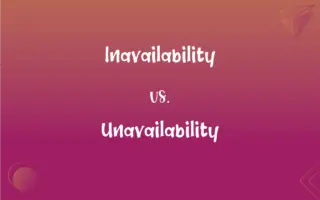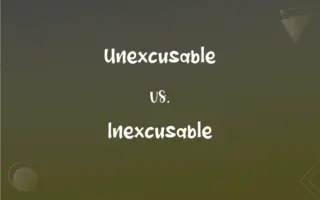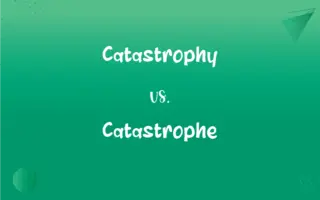Agre vs. Agree: Mastering the Correct Spelling
Edited by Aimie Carlson || By Janet White || Updated on March 11, 2024
"Agre" is an incorrect spelling. "Agree" is the correct spelling, meaning to have the same opinion or accept a proposal.

Which is correct: Agre or Agree
How to spell Agree?

Agre is Incorrect

Agree is Correct
ADVERTISEMENT
Key Differences
Think of the word "green" which also has two 'e's, and signifies a positive, agreeing light.
Recall that "Agree" has two 'e's, just like "tree" which stands tall with agreement.
Associate "Agree" with "degree" – both have double 'e' at the end.
Remember the phrase, “We agree,” emphasizing the “ee” sound at the end.
Practice by writing sentences using "Agree" to reinforce the correct spelling.
ADVERTISEMENT
Correct usage of Agree
Let's try to agre on a solution that benefits everyone.
Let's try to agree on a solution that benefits everyone.
We need to agre on a time for the meeting.
We need to agree on a time for the meeting.
Do you agre with the decision made by the committee?
Do you agree with the decision made by the committee?
Can you agre to the terms of this contract?
Can you agree to the terms of this contract?
It's hard to find a topic we both agre on.
It's hard to find a topic we both agree on.
Agree Definitions
Agree means to have the same opinion or view.
We both agree on this matter.
Agree can refer to giving consent or acceptance.
I agree to the terms and conditions.
Agree means to be consistent with something else.
The results agree with our hypothesis.
To share an opinion or feeling; be in accord
I agree with you on that. We agree in our taste in music.
To express consent; concur
We agreed to her suggestion.
To accept or support a policy or program
I agree with the flat tax.
To come to an understanding or agreement, as by negotiating
We agreed on the price.
To be compatible or consistent
The copy agrees with the original. Your story agrees with mine.
To be suitable, appropriate, pleasing, or healthful
Spicy food does not agree with me.
(Grammar) To correspond in gender, number, case, or person.
To share an opinion about (something)
My doctor and I agree that I should quit smoking.
To grant or concede
My parents agreed that we should be allowed to go. I agreed to help my parents clean the house.
(intransitive) To be in harmony about an opinion, statement, or action; to have a consistent idea between two or more people.
All parties agree in the expediency of the law.
I mostly agree with what you said, but I consider your last point to be unfair.
I couldn't agree more with what you say.
To give assent; to accede
To agree to an offer, or to opinion.
The workers didn not agree to the new terms offered by the trade union.
To yield assent to; to approve.
(intransitive) To make a stipulation by way of settling differences or determining a price; to exchange promises; to come to terms or to a common resolve; to promise.
(intransitive) To resemble; to coincide; to correspond.
The picture does not agree with the original; the two scales agree exactly.
To suit or be adapted in its effects; to do well.
The same food does not agree with every constitution.
To correspond to (another word) in a grammatical category, such as gender, number, case, or person.
In Romanian, all articles, adjectives, and pronouns agree in gender, number and case with the noun they refer to.
To consent to a contract or to an element of a contract.
To harmonize in opinion, statement, or action; to be in unison or concord; to be or become united or consistent; to concur; as, all parties agree in the expediency of the law.
If music and sweet poetry agree.
Their witness agreed not together.
The more you agree together, the less hurt can your enemies do you.
To yield assent; to accede; - followed by to; as, to agree to an offer, or to opinion.
To make a stipulation by way of settling differences or determining a price; to exchange promises; to come to terms or to a common resolve; to promise.
Agree with thine adversary quickly.
Didst not thou agree with me for a penny ?
To be conformable; to resemble; to coincide; to correspond; as, the picture does not agree with the original; the two scales agree exactly.
To suit or be adapted in its effects; to do well; as, the same food does not agree with every constitution.
To correspond in gender, number, case, or person.
To make harmonious; to reconcile or make friends.
To admit, or come to one mind concerning; to settle; to arrange; as, to agree the fact; to agree differences.
Be in accord; be in agreement;
We agreed on the terms of the settlement
I can't agree with you!
I hold with those who say life is sacred
Both philosophers concord on this point
Consent or assent to a condition, or agree to do something;
She agreed to all my conditions
He agreed to leave her alone
Be compatible, similar or consistent; coincide in their characteristics;
The two stories don't agree in many details
The handwriting checks with the signature on the check
The suspect's fingerprints don't match those on the gun
Go together;
The colors don't harmonize
Their ideas concorded
Show grammatical agreement;
Subjects and verbs must always agree in English
Be agreeable or suitable;
White wine doesn't agree with me
Achieve harmony of opinion, feeling, or purpose;
No two of my colleagues would agree on whom to elect chairman
Agree is to say 'yes' to a proposal or request.
The board agreed to the new strategy.
Agree is to live harmoniously without conflict.
They agree on most topics and seldom argue.
Agree Sentences
If we all agree, we can start the project sooner.
Do you agree with the answer to the math problem?
The scientists agree that the experiment was a success.
I agree that homework is important for learning.
She didn't agree with the changes to the schedule.
I agree, pizza is the best food for a party.
They couldn't agree on which movie to watch.
We need to agree on a date for the trip.
They agree it's time to clean up the environment.
Can you agree to help me with my homework?
It's important to agree on rules before playing a game.
I agree, reading every day improves your mind.
Can we agree to meet at the park at noon?
It's rare for everyone to agree on what game to play.
I hope we can agree on a fair way to share.
The team needs to agree on a strategy for the game.
Teachers agree that asking questions is a good way to learn.
We finally agree on a place to go for vacation.
It's good when friends agree on what to do together.
I agree, safety rules are very important.
It's hard to agree on a bedtime that seems fair.
If we can't agree, we should ask a teacher for help.
The jury has to agree before deciding the verdict.
Agree Idioms & Phrases
Agree on all counts
To fully concur with everything that has been said or proposed.
After reviewing the proposal, the committee found they could agree on all counts.
Can't agree more
To strongly agree with someone's statement or opinion.
When she said that every child deserves education, I couldn't agree more.
Agree in writing
To formalize an agreement by documenting it.
The landlord and tenant agree in writing on the terms of the lease.
Secretly agree
To concur with something internally without expressing it openly.
She secretly agree with the criticism but didn't want to admit it publicly.
Mutually agree
When two or more parties come to a common agreement.
After negotiations, both companies mutually agree to the terms of the merger.
Verbally agree
To consent or concur through spoken word, without written confirmation.
They verbally agree to the plan during the meeting, with formal approval to follow.
Agree by nodding
To show agreement through a physical gesture, such as nodding the head.
When asked if he understood, he replied by agree by nodding.
Agree to disagree
To accept that there is a difference of opinion and move on.
After a long debate about the best superhero, they decided to agree to disagree.
Agree with the majority
To concur with the opinion or decision of the majority of people.
Although he had reservations, he decided to agree with the majority on the vote.
Publicly agree
To openly concur with an idea or statement in a public setting.
The politician publicly agree to the reforms during the press conference.
Agree in principle
To concur on a general idea but not necessarily on the specifics.
They agree in principle on the need for a new policy but have yet to work out the details.
Reluctantly agree
To consent to something despite doubts or unwillingness.
She reluctantly agree to the extra work, knowing it was necessary.
Tentatively agree
To agree provisionally, subject to further confirmation.
They tentatively agree on a date for the event, waiting for final approval.
Wholeheartedly agree
To agree completely and with enthusiasm.
I wholeheartedly agree that we should prioritize environmental conservation.
Quickly agree
To come to an agreement rapidly without much deliberation.
They quickly agree on the terms, eager to move forward.
Silently agree
To consent to something without verbalizing it.
They all silently agree that it was the best solution, even though no one said it aloud.
Formally agree
To establish an agreement in a formal or official manner.
The two leaders formally agree to the treaty during the summit.
Hesitantly agree
To agree with reservations or reluctance.
He hesitantly agree to the plan, still unsure if it was the right decision.
Freely agree
To consent willingly and without coercion.
Everyone at the meeting freely agree to the new guidelines.
Unanimously agree
When all members of a group or panel are in complete agreement.
The jury unanimously agree on the verdict after several hours of deliberation.
FAQs
What is the pronunciation of Agree?
It's pronounced ə-GREE.
What is the root word of Agree?
The root is derived from the Old French "agreer."
Why is it called Agree?
The term "Agree" comes from Old French "agreer," meaning to please or satisfy.
Which preposition is used with Agree?
"With" or "to" as in "agree with someone" or "agree to a proposal."
What is the singular form of Agree?
"Agree" itself is a verb and doesn't have singular or plural forms.
Which vowel is used before Agree?
"A" as in "an" can be used before "Agree."
Is Agree an abstract noun?
No, "Agree" is a verb.
What is the verb form of Agree?
The verb form is "Agree."
Is Agree a vowel or consonant?
"Agree" is a word composed of both vowels and consonants.
Is Agree a collective noun?
No, "Agree" is not a noun.
Is the Agree term a metaphor?
No, "Agree" is not a metaphor in itself.
How many syllables are in Agree?
There are two syllables in "Agree."
What part of speech is Agree?
"Agree" is a verb.
What is the first form of Agree?
The first form is "Agree."
What is the plural form of Agree?
Verbs don’t have plural forms, so "Agree" remains the same.
Which conjunction is used with Agree?
No specific conjunction is directly linked to "Agree."
Which article is used with Agree?
"An" as in "an agreeable person."
What is the second form of Agree?
The second form is "Agreed."
Is Agree an adverb?
No, "Agree" is not an adverb.
Is Agree a countable noun?
"Agree" is not a noun.
Is the word Agree imperative?
It can be, as in "Agree to the terms!"
How do we divide Agree into syllables?
A-gree.
What is a stressed syllable in Agree?
The second syllable, "gree," is stressed.
What is another term for Agree?
Another term could be "concur."
What is the third form of Agree?
The third form is "Agreed."
Is Agree a noun or adjective?
"Agree" is primarily a verb. "Agreeable" is its adjective form.
Is Agree a negative or positive word?
"Agree" is typically seen as a positive word, indicating harmony or consent.
What is the opposite of Agree?
The opposite is "disagree" or "oppose."
Which determiner is used with Agree?
Determiners like "the" or "this" can precede nouns or adjectives related to "Agree," but not the verb itself.
How is Agree used in a sentence?
I agree with your viewpoint on this issue.
About Author
Written by
Janet WhiteJanet White has been an esteemed writer and blogger for Difference Wiki. Holding a Master's degree in Science and Medical Journalism from the prestigious Boston University, she has consistently demonstrated her expertise and passion for her field. When she's not immersed in her work, Janet relishes her time exercising, delving into a good book, and cherishing moments with friends and family.
Edited by
Aimie CarlsonAimie Carlson, holding a master's degree in English literature, is a fervent English language enthusiast. She lends her writing talents to Difference Wiki, a prominent website that specializes in comparisons, offering readers insightful analyses that both captivate and inform.


























































